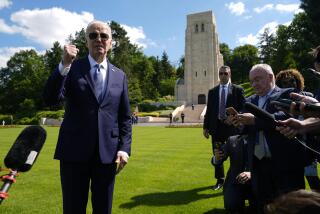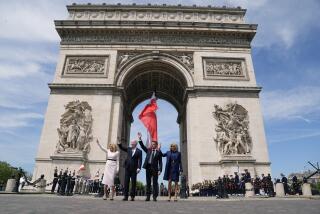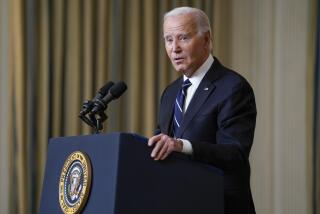In France, Bush Stays Focused on Asia
PARIS — President Bush kept up steady pressure on Pakistan on Sunday to halt rebel incursions into the Indian-controlled portion of Kashmir and to help bring calm to its tense border in the disputed region.
He also said the U.S. is considering Russian President Vladimir V. Putin’s report that his country is confident that the aid it gives to Iran’s nuclear power program will not “enable Iran to develop weapons of mass destruction.”
Bush spoke at a news conference at the Elysee Palace here with French President Jacques Chirac. The two leaders met after Bush’s arrival from Russia.
Bush is nearing the end of a weeklong trip. He will mark Memorial Day today at the American Cemetery on a cliff overlooking Omaha Beach in Normandy and will spend Tuesday, the last day of his trip, in Rome.
Bush showed signs of fatigue after staying out until just before midnight Saturday, very late by the standards of this early-to-rise, early-to-bed president. He and Putin attended a performance of “The Nutcracker” ballet in St. Petersburg--also a rare event for a president whose taste in cultural diversions runs more toward baseball--and then spent several hours cruising the Neva River.
In their news conference, Bush and Chirac sought to minimize the gap between European public opinion and the policies the United States and its major Western allies are pursuing in the war on terrorism.
Bush’s first stop, in Germany, brought out 20,000 demonstrators to protest a variety of U.S. policies, from support of Israel to the war in Afghanistan and Washington’s opposition to the Kyoto Protocol on global warming. Smaller demonstrations took place Sunday in Paris.
Chirac said the protests do not reflect an aversion “to the president of the United States or to the U.S. people as a whole.” And Bush praised France for taking the lead in Europe in searching for terrorists.
In the conflict between India and Pakistan, the United States is finding that it has few cards it can play, because it relies on Pakistan in the effort to track down members of the Al Qaeda terrorist network and the former Taliban regime of Afghanistan.
The Bush administration’s greatest concern is not Pakistan’s tests over the weekend of missiles capable of reaching India, but continual incursions into the country by Islamic militants from Pakistani territory. Pakistani President Pervez Musharraf promised in January that he would bring them to a halt.
Bush said he was insisting that “President Musharraf show results in terms of stopping people from crossing the Line of Control, stopping terrorism. What’s more important than the missile testing is that he perform.”
Earlier in the day, speaking with reporters outside a synagogue he visited in St. Petersburg, the president said the United States had expressed “strong reservations” to Pakistan about the tests.
Secretary of State Colin L. Powell, speaking in St. Petersburg on CNN’s “Late Edition,” said that India seemed to be taking the tests in stride, “but we were disappointed that the Pakistanis decided to conduct these tests during a time of high anxiety and tension.”
“The whole international community is seized with this problem,” Powell added. “We’ve got to get back from the edge, because these are nuclear-armed nations, and they also have huge conventional forces.”
The issue of Russian support for the construction of a nuclear reactor in Bushehr, Iran, proved to be one of the more sensitive topics during Bush’s meetings with Putin. Bush said the Russian was willing to allow international inspectors to determine whether such a project could develop weapons of mass destruction.
“And we’re thinking about what he told us,” Bush said of Putin’s assurances.
Bush also called attention in St. Petersburg to what he said was “a new attitude” among some Palestinian leaders. The president added that he was withholding judgment of Yasser Arafat to see whether the Palestinian Authority president holds to his promise to halt Palestinian attacks on Israelis and to reform the Palestinian leadership.
Bush began the Paris news conference listening to a 10-minute account by Chirac of their private meeting. When it was his turn to speak, Bush quickly said, “It’s true,” as if all he wanted was to agree with Chirac, get on with the questions and have dinner.
He then delivered his own brief summary of the meeting, wrapping it up by saying: “I’m looking forward to the dinner. He’s always saying that the food here is fantastic, and I’m going to give him a chance to show me tonight.”
Eventually, Bush perked up.
When Chirac was asked whether he had underestimated Bush a year ago, the U.S. president interjected: “Like everybody else.”
Then, when Bush couldn’t remember the second part of a three-part question, he said, “I’m jet-lagged.” He asked for help on the third part, saying, “That’s what happens when you’re over 55.” Bush turned 55 last July 6.
PARIS--President Bush kept up steady pressure on Pakistan on Sunday to halt rebel incursions into the Indian-controlled portion of Kashmir and to help bring calm to its tense border in the disputed region.
He also said the U.S. is considering Russian President Vladimir V. Putin’s report that his country is confident that the aid it gives to Iran’s nuclear power program will not “enable Iran to develop weapons of mass destruction.”
Bush spoke at a news conference at the Elysee Palace here with French President Jacques Chirac. The two leaders met after Bush’s arrival from Russia.
Bush is nearing the end of a weeklong trip. He will mark Memorial Day today at the American Cemetery on a cliff overlooking Omaha Beach in Normandy and will spend Tuesday, the last day of his trip, in Rome.
Bush showed signs of fatigue after staying out until just before midnight Saturday, very late by the standards of this early-to-rise, early-to-bed president. He and Putin attended a performance of “The Nutcracker” ballet in St. Petersburg--also a rare event for a president whose taste in cultural diversions runs more toward baseball--and then spent several hours cruising the Neva River.
In their news conference, Bush and Chirac sought to minimize the gap between European public opinion and the policies the United States and its major Western allies are pursuing in the war on terrorism.
Bush’s first stop, in Germany, brought out 20,000 demonstrators to protest a variety of U.S. policies, from support of Israel to the war in Afghanistan and Washington’s opposition to the Kyoto Protocol on global warming. Smaller demonstrations took place Sunday in Paris.
Chirac said the protests do not reflect an aversion “to the president of the United States or to the U.S. people as a whole.” And Bush praised France for taking the lead in Europe in searching for terrorists.
In the conflict between India and Pakistan, the United States is finding that it has few cards it can play, because it relies on Pakistan in the effort to track down members of the Al Qaeda terrorist network and the former Taliban regime of Afghanistan.
The Bush administration’s greatest concern is not Pakistan’s tests over the weekend of missiles capable of reaching India, but continual incursions into the country by Islamic militants from Pakistani territory. Pakistani President Pervez Musharraf promised in January that he would bring them to a halt.
Bush said he was insisting that “President Musharraf show results in terms of stopping people from crossing the Line of Control, stopping terrorism. What’s more important than the missile testing is that he perform.”
Earlier in the day, speaking with reporters outside a synagogue he visited in St. Petersburg, the president said the United States had expressed “strong reservations” to Pakistan about the tests.
Secretary of State Colin L. Powell, speaking in St. Petersburg on CNN’s “Late Edition,” said that India seemed to be taking the tests in stride, “but we were disappointed that the Pakistanis decided to conduct these tests during a time of high anxiety and tension.”
“The whole international community is seized with this problem,” Powell added. “We’ve got to get back from the edge, because these are nuclear-armed nations, and they also have huge conventional forces.”
The issue of Russian support for the construction of a nuclear reactor in Bushehr, Iran, proved to be one of the more sensitive topics during Bush’s meetings with Putin. Bush said the Russian was willing to allow international inspectors to determine whether such a project could develop weapons of mass destruction.
“And we’re thinking about what he told us,” Bush said of Putin’s assurances.
Bush also called attention in St. Petersburg to what he said was “a new attitude” among some Palestinian leaders. The president added that he was withholding judgment of Yasser Arafat to see whether the Palestinian Authority president holds to his promise to halt Palestinian attacks on Israelis and to reform the Palestinian leadership.
Bush began the Paris news conference listening to a 10-minute account by Chirac of their private meeting. When it was his turn to speak, Bush quickly said, “It’s true,” as if all he wanted was to agree with Chirac, get on with the questions and have dinner.
He then delivered his own brief summary of the meeting, wrapping it up by saying: “I’m looking forward to the dinner. He’s always saying that the food here is fantastic, and I’m going to give him a chance to show me tonight.”
Eventually, Bush perked up.
When Chirac was asked whether he had underestimated Bush a year ago, the U.S. president interjected: “Like everybody else.”
Then, when Bush couldn’t remember the second part of a three-part question, he said, “I’m jet-lagged.” He asked for help on the third part, saying, “That’s what happens when you’re over 55.” Bush turned 55 last July 6.
Times staff writer Mark Fineman in Washington contributed to this report.
More to Read
Sign up for Essential California
The most important California stories and recommendations in your inbox every morning.
You may occasionally receive promotional content from the Los Angeles Times.










